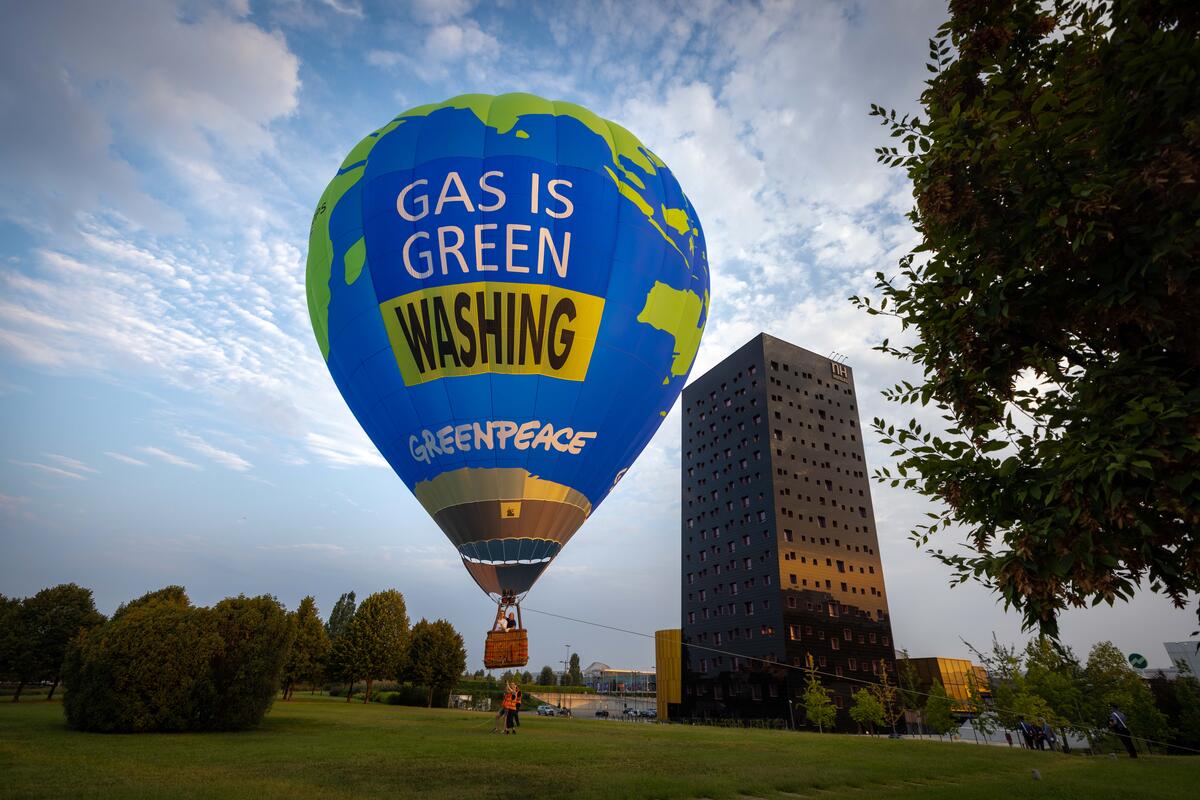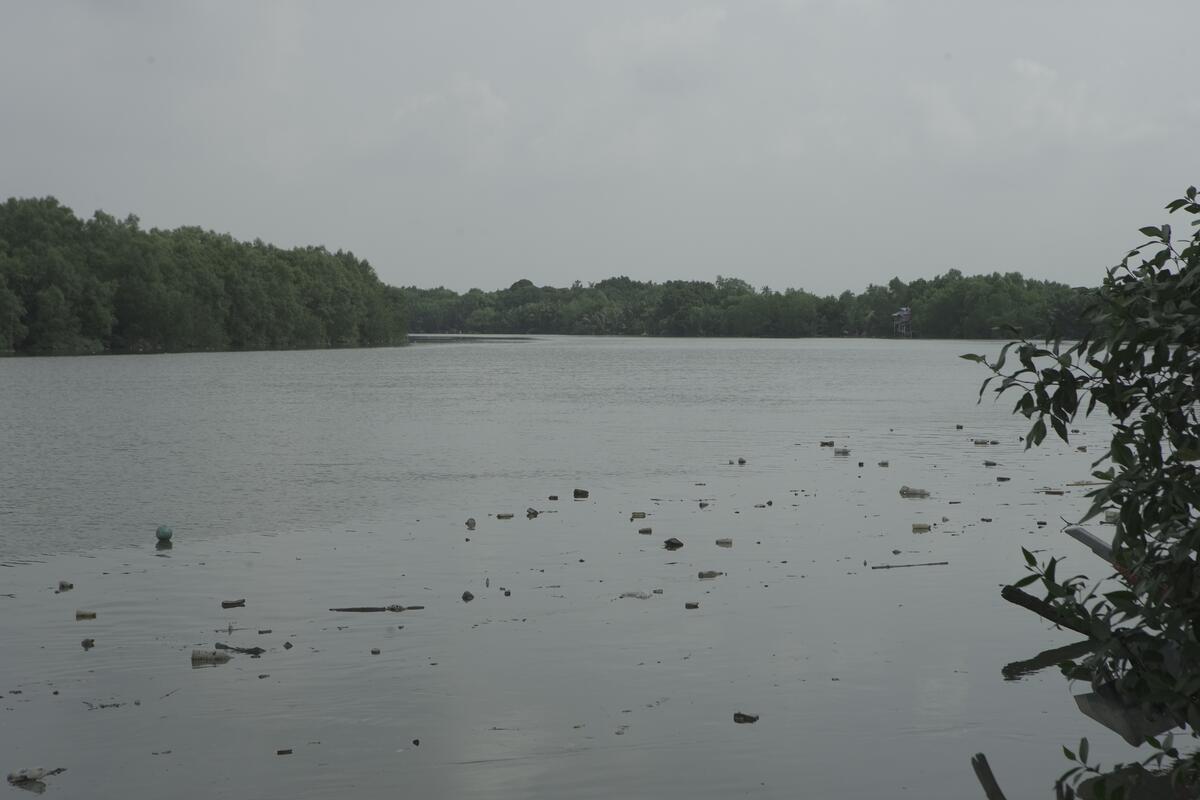Civil society groups and trade unions urge Prime Minister Datuk Seri Anwar to champion clean air for all, indigenous rights, workers rights under the framework of climate justice at the ASEAN Summit 2025
KUALA LUMPUR, 26 May 2025 – As Malaysia takes on the ASEAN Chairmanship 2025 today under the theme ‘Inclusivity and Sustainability’, civil society groups across Southeast Asia call on Malaysia’s Prime Minister Datuk Seri Anwar to show bold leadership at the ASEAN Summit 2025 in delivering a legally binding ASEAN Environmental Rights (AER) framework.
Greenpeace Southeast Asia with over 200 regional allies, gathered yesterday at Wisma MCA, Kuala Lumpur to co-host two key side events highlighting environmental and human rights violations driven by industrial pollution and destructive agricultural practices, forest and peatland degradation, and the major lack of accountability by corporations. The events, ‘Tackling Transboundary Haze, Heat Stress and Forest Governance in Southeast Asia’ and ‘Corporate Accountability – Demanding Climate Justice in Southeast Asia’ explores hard-hitting stories and case studies from activists, legal and environmental experts, and affected indigenous communities standing united in demanding real accountability for environmental harm and climate injustice.
Among the most urgent crises highlighted was extreme heat, which is already taking lives and threatening livelihoods across Southeast Asia. For construction workers and other outdoor and informal workers, heat stress is not just uncomfortable, but it can be life-threatening. The International Labour Organization (ILO) estimates up to 250,000 annual heat-related deaths between 2030 and 2050 if bold interventions are not taken. This makes heat stress not just a climate crisis, but also a labour and human rights emergency.
According to the ASEAN Community Vision 2045, the region is facing “unprecedented environmental pressures” that threaten its long-term stability and prosperity [1]. This warning is already playing out in real time. With Thailand experiencing its worst drought in over 40 years that is affecting more than 10 million people, reducing rice yields, and sparking intense competition over water resources [2].
The key call to action: Malaysia’s Prime Minister Anwar Ibrahim and ASEAN leaders must institutionalise a legally binding ASEAN Environmental Rights (AER) framework that upholds the public’s right to a clean, healthy, and sustainable environment while strengthening accountability for transboundary environmental harm and elevating the voices of Indigenous Peoples and Local Communities (IPLCs) on the frontlines of the climate and ecological crisis with Malaysia leading as a prime example. It must also enshrine heat stress protections, occupational safety and health rights, and the voice of labour in climate policy. Seeing as Southeast Asia is warming faster than the global average — with climate-related disasters costing over US$97 billion in damages between 2005 and 2019 alone, this move is not just necessary, but long overdue [3].
We also urge the ASEAN Intergovernmental Commission on Human Rights (AICHR) to play an active role in ensuring the AER framework genuinely reflects the demands and realities of the region’s most vulnerable communities.
CERAH Malaysia Secretary, Kiu Jia Yaw:
In regards to the Roadmap on ASEAN Cooperation towards Transboundary Haze Pollution Control with Means of Implementation, ASEAN and its leaders must hold their national and transnational corporations to account for transboundary pollution that they cause or contribute whether directly or indirectly within their supply chains.
ASEAN governments — particularly ministries and departments responsible for environmental affairs — must also work closely with the public to ensure inclusivity, transparency, and accountability towards decision-making in environmental governance. Public participation is imperative in shedding light on these issues, developing better policies, tightening data transparency and providing the right to accessing readily available corporate and sustainability information to stay informed.
Building and Woodworkers International (BWI) Regional Climate and Forestry Officer, Wong Yan Ke:
Extreme heat is not just a seasonal event, it is a lethal, silent killer already taking lives across Southeast Asia. ASEAN must act now by recognising heat stress as a serious occupational safety and health hazard. We demand three things: the right to stop work when it’s too hot, protection from heat, and compensation during work stoppages. These are basic protections, and not negotiable.
ASEAN must step up as the leader of Global South, to put heat stress at the centre of the global agenda at COP30. We must demand adaptation funding, binding international standards, and climate justice for the workers already on the frontlines. If we remain silent, we become complicit in the next preventable death.
Sahabat Alam Malaysia Environmental Researcher, Hilary Kung:
Financial institutions in ASEAN must play a more responsible role in halting deforestation, biodiversity loss, and transboundary haze. This includes aligning with the 38 criteria in the Forests & Finance policy assessment methodology, ensuring strong due diligence and independent verification processes, and publicly disclosing the companies and projects they finance — along with their full biodiversity impacts and any related complaints. Such institutions should work towards implementing holistic and just transition plans, and provide accessible grievance mechanisms for affected communities. These steps are critical in ensuring transparency, accountability, and meaningful sustainability action.
At the same time, policymakers must recognise that binding financial regulation is a prerequisite to achieving the Global Biodiversity Framework targets. Regulatory frameworks should push for greater transparency, integration of social risks into climate policies, and clear expectations for financial institutions to disclose Scope 3 financed emissions. ASEAN leaders and governments must also establish mechanisms to hold these financial institutions accountable for the environmental and human rights impacts of their investments, while addressing the root drivers of biodiversity loss including land rights violations and greenwashing within the financial system.
Greenpeace Indonesia Forest Campaigner, Sekar Banjaran Aji:
It is time for our leaders to stop turning a blind eye and start upholding real environmental justice. This must serve as a wake-up call: people can no longer remain silent in the face of disasters that rob them of their health, livelihoods, and future. In response, ASEAN must strengthen regional enforcement mechanisms, promote transparency of fire hotspot and land concession data, and support citizen-led legal action. Neighbouring countries also have a shared responsibility to push for accountability and transparency from transnational corporations, many of whom are directly implicated in deforestation and recurring peatland fires.
Greenpeace Thailand Food and Forest Campaigner, Rattanasiri Kittikongnapang:
ASEAN can no longer remain silent in the face of public outcry over transboundary pollution, whether it’s toxic haze drifting into our lungs or dangerous chemicals contaminating the Kok River from mining in neighboring states. We must acknowledge today that geographical borders cannot stop the spread of pollution into our air and water. ASEAN must enforce the regional legal binding environmental framework that holds transnational corporations accountable for the environmental damage they cause across borders. This is a matter of justice and shared responsibility to protect our regional commons.
Greenpeace Philippines Campaigner, Jefferson Chua:
The right to clean air, safe drinking water, and a healthy environment is no longer up for debate—these are already established state obligations under international law. Yet across Southeast Asia, where communities are among the most vulnerable to climate impacts, these rights remain out of reach for many. This not only levies an economic burden upon ASEAN governments but also robs people of their dignity. A strong and binding ASEAN Environmental Rights framework should guarantee the necessary finance for climate loss and damage across the region, while ensuring corporate accountability mechanisms that compel the biggest polluters to pay. In the Philippines, the swift passage of the climate accountability bill would enshrine corporate climate accountability into law. This sets an example other ASEAN nation states can adopt for their own domestic climate accountability policies.
Sahabat Alam Malaysia Legal Advisor, Theiva Lingam:
All ASEAN Governments must move beyond the realm of voluntary ESG (Environmental, Social, and Governance) commitments and take decisive action to institute mandatory, enforceable regulations that hold companies accountable for their environmental and human rights performance. The gravity of the challenges facing us today, including climate change, biodiversity loss, labour exploitation, and violations of human rights, demands that we adopt a more stringent approach. It is no longer sufficient for corporations to merely aspire to meet ESG goals; they must be compelled by law to adhere to clear and rigorous standards. There must be an enabling environment within ASEAN for this to happen.
This transition to mandatory regulation will ensure that all entities operate on a level playing field, fostering a culture of transparency, responsibility, and sustainability. By enacting and enforcing these regulations, governments can drive meaningful progress towards a more equitable and environmentally sound future for all.
Centre for Energy, Ecology and Development (CEED) Executive Director, Gerry Arances:
In this critical moment for Southeast Asia, Malaysia has the opportunity and responsibility to lead ASEAN in closing the gap between climate ambition and action. True climate justice demands that we put people and communities—not polluters—at the heart of our development. Our region is rich in renewable resources, and we must champion a just energy transition that phases out fossil fuels while guaranteeing every individual’s right to a healthy environment. This is the moment for bold, people-centered leadership. Any further delay will only amplify the injustices and risks facing our region. The time to act is now!
Union for Forestry Employees Sarawak (UFES), Rugayah Binti Hamdan:
Forest certification schemes such as PEFC and FSC may formally recognise workers’ and trade union rights, but in practice, union busting remains prevalent among some certificate holders. The gap between policy and reality is alarming, and if left unaddressed, these schemes risk becoming mere greenwashing tools for exploitation.
To uphold credibility, we must strengthen social auditing by involving trade unions in the audit process, conducting unannounced inspections, and ensuring workers are randomly and confidentially selected for interviews. Certification must serve as a tool for genuine accountability, transparency, and justice for workers on the ground.
– ENDS –
Resources:
[1] https://theaseanmagazine.asean.org/article/achieving-the-asean-community-vision-2045
[2] https://mekonginstitute.org/thailands-drought-and-the-havoc-it-brought
[3] https://theaseanmagazine.asean.org/article/achieving-the-asean-community-vision-2045



